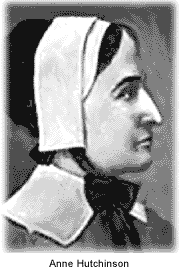Born in Lincolnshire, England, Anne Hutchinson immigrated to Massachusetts Bay with her husband and family in 1634. She was initially highly regarded in the community because of her intelligence and caring nature, but later ran into difficulty because of her religious views and outspoken nature.
 Deeply fascinated by intricate theological issues, Hutchinson began to hold weekly discussion groups in her home following Sunday services. Attendance at these meetings grew rapidly and included young governor Henry Vane as well as several of the colony’s other leading citizens. After establishing her skill as the discussion leader, Hutchinson revealed her support of the efficacy of faith alone (the covenant of grace) as they key to salvation, as opposed to the standard Puritan emphasis on good works (the covenant of works). She also expressed her belief that God revealed himself to individuals without the aid of clergy.
Deeply fascinated by intricate theological issues, Hutchinson began to hold weekly discussion groups in her home following Sunday services. Attendance at these meetings grew rapidly and included young governor Henry Vane as well as several of the colony’s other leading citizens. After establishing her skill as the discussion leader, Hutchinson revealed her support of the efficacy of faith alone (the covenant of grace) as they key to salvation, as opposed to the standard Puritan emphasis on good works (the covenant of works). She also expressed her belief that God revealed himself to individuals without the aid of clergy.
John Winthrop was leery of Hutchinson’s views and cautioned that women could do irreparable damage to their brains by pondering deep theological matters — a view not uncommon for the day. Winthrop and John Cotton led the opposition to Hutchinson and charged that she and her followers were guilty of the antinomian heresy. She was brought to trial before the General Court in 1637, found guilty and banished from the Bay Colony.
Hutchinson joined other dissenters in the establishment of Portsmouth, Rhode Island. Following her husband’s death, she moved to Long Island and finally to Pelham Bay. In 1643, Hutchinson and other family members were killed in an Indian attack.
Anne Hutchinson’s religious views were a threat not only to the Puritan clergy, but also to the civil authorities of Massachusetts Bay. If an individual's beliefs and conduct were strictly matters between that person and God, then what was the need for ministers and government officials? Hutchinson ranks with Roger Williams as a leading voice of dissent in early New England.